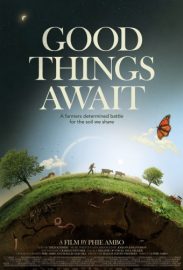
https://www.filmplatform.net/product/good-things-await
Niels is 79 years old and one of the last idealistic farmers in the agricultural country of Denmark. He makes some of the world’s finest products, praised by the consumers, prized by the world’s best restaurant, NOMA in Copenhagen, and nursed in harmony with the universe. But Niels’ ways of farming in accordance with the planets and the primal instincts of the animals are not too popular with the authorities. They are threatening to withdraw his license to keep cattle, the buildings are deteriorating, and with no successor to take over, Niels risks seeing his life fall apart.

The Danish Red is a rare breed of cattle, and Niels Stokholm, who is approaching 80, has made it his life’s mission to save it, working together with his partner Rita on his biodynamic farm in the Danish countryside. Filmmaker Phie Ambo follows their lives over the course of an exciting year in which government inspectors regularly visit the farm to point out that Stokholm’s methods for keeping his cattle contravene animal welfare regulations. He faces substantial fines and perhaps even a shutdown of the business, but Stokholm is a stubborn man. He has no intention of changing his methods, which are part and parcel of his outlook on life and the influence of the cosmos.
A businessman from the city, however, does appreciate Stokholm’s philosophy and wants to associate several hip restaurants with the farm – it would mean some welcome additional income for Stokholm. Ambo documents the calm rhythm of farm life, Stokholm’s musings and the visits by inspectors and supporters alike. Occasionally, the tempo slows even further, becoming a lyrical visual poem accompanied by sacred music that brings Stokholm’s mystical ideas to life.
Niels is 79 years old and one of the last idealistic farmers in the agricultural country of Denmark. He makes some of the world’s finest products, praised by the consumers, prized by the world’s best restaurant, NOMA in Copenhagen, and nursed in harmony with the universe. But Niels’ ways of farming in accordance with the planets and the primal instincts of the animals are not too popular with the authorities. They are threatening to withdraw his license to keep cattle, the buildings are deteriorating, and with no successor to take over, Niels risks seeing his life fall apart.
Is Niels’ way of pre-industrial farming actually the most modern way of farming? He produces healthy and tasteful products but is fighting against rules set by the industrial farming culture. What effect will these rules have in the long term on our crop, food and animals? And what effect will it have on planet Earth and the universe? Farmer Niels has an idea about this, and with his stubbornness and insight he will fight every day to pass this knowledge onto us.